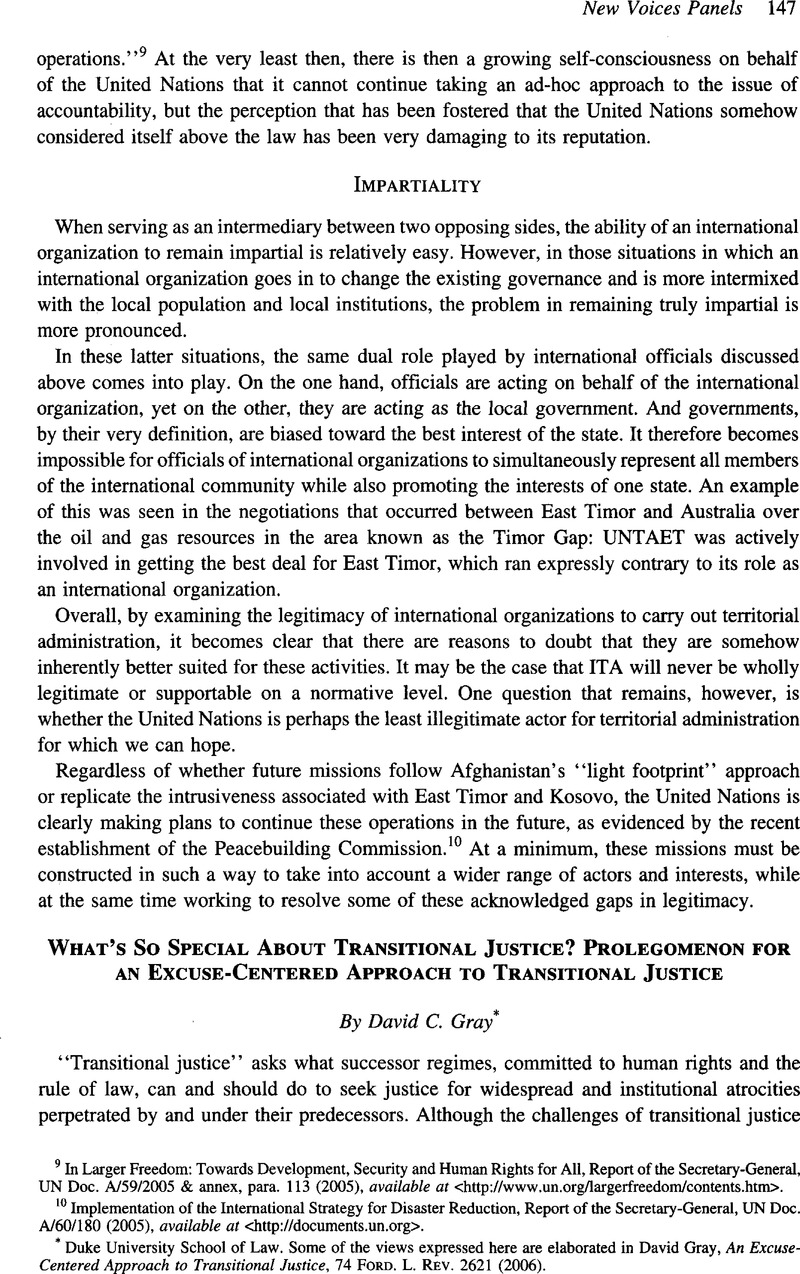No CrossRef data available.
Article contents
What’s So Special About Transitional Justice? Prolegomenon for an Excuse-Centered Approach to Transitional Justice
Published online by Cambridge University Press: 28 February 2017
Abstract

- Type
- New Voices Panels
- Information
- Copyright
- Copyright © American Society of International Law 2006
References
1 Elster, Jon, Closing the Books: Transitional Justice in Historical Perspective, 3-21 (2004)CrossRefGoogle Scholar.
2 See Posner, Eric & Vermeule, Adrian, Transitional Justice as Ordinary Justice, 117 Harv. L. Rev. 761 (2004)CrossRefGoogle Scholar.
4 Daniel Goldhagen, Hitler’S Willing Executioners (1996). There are many implicated in mass violence who were not so willing, of course. in all abusive regimes there are those who actively oppose. It remains the case, however, that atrocities require the support of thousands of participants, passive supporters, opportunistic profiteers, and those who indulge in naive denial. While we may applaud the heroes, we are left to wonder how so many were led to such madness. The key to answering this question is to take seriously the possibility that the practical realities of scale and complicity that distinguish abusive regimes are not merely the same problems that face “ordinary justice” on a different scale but, rather, mark unique social conditions that carry normative force.
5 Id. at 164-78.
6 See Prosecutor v. Nahimana, Barayagwiza, Ngeze, Judgment and Sentence, No. ICTR-99-52-T (Dec. 3, 2003).
7 Aukerman, Miriam, Extraordinary Evil Ordinary Crime: A Framework for Understanding Transitional Justice, 15 Harv. Hum Rts. L.J. 59, 75 (2002)Google Scholar.
8 Elster, supra note 1, at 83, 235-40; Martha Minow, Between Vengeance and Forgiveness 25, 30-37 (1996); Golding, Martin, Retroactive Legislation and Restoration of the Rule of Law, Ann. Rev. L. & Ethics, 170-74 (1996)Google Scholar.
9 Ashworth, Andrew, Principles of Criminal Law 70-74 (4th ed. 2003)Google Scholar; Blackstone, William, Commentaries on the Laws of England 45-47 (1765-1769)Google Scholar; Fuller, Lon, The Morality of Law 39, 248-49 (1969)Google Scholar; Hall, Jerome, General Principles of Criminal Law 27-69 (2d ed. 1960)Google Scholar; Packer, Herbert, The Limits of the Criminal Sanction 79-87 (1968)Google Scholar; Fuller, Lon, Positivism and Fidelity to Law—A Reply to Professor Hart, 71 Harv. L. Rev. 630, 650-51 (1958)CrossRefGoogle Scholar [hereinafter Reply].
10 I take this term from Ruti Tettel, Transitional Justice (2000).
11 Levinson, Sanford, Trials, Commissions, and Investigating Committees, in Truth V. Justice: The Morality of Truth Commissions 211, 219 (Rotberg, Robert I. & Thompson, Dennis eds., 2000)Google Scholar.
12 Teitel, supra note 10, at 19.
13 Id. at 18-20.
14 Abusive regimes frequently justify abuses by classifying victims such that they cannot be “murdered” or “raped.” See Rorty, Richard, Human Rights, Rationality, and Sentimentality, in On Human Rights 112-14 (Shute, Stephen & Hurley, Susan eds., 1993)Google Scholar.
15 See Swartz, Omar, Codifying the Law of Slavery in North Carolina: Positive Law and the Slave Persona, 29 T. Marshall L. Rev. 285, 291-300 (2004)Google Scholar (discussing failed prosecutions of slave owners for assault and murder). The same cannot be said of lynch mobs in the 1920s. The Reconstruction Amendments and federal criminal statutes made clear to all Americans the inherent evil of the social ontology that categorized those of African and Caribbean heritage as subhuman rather than citizens deserving of full legal protection.
16 Jaspers, Karl, The Question of German Guilt 67-75 (2000)Google Scholar (originally published as Die Schuldfrage (1947)).
17 An argument for absolute duties of repair based on moral and political guilt is elaborated in David Gray, A No Excuse Approach to Transitional Justice (April 13, 2006) (unpublished manuscript, on file with author).




